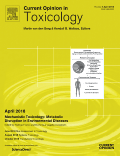
Current Opinion in Toxicology
Scope & Guideline
Delivering Cutting-edge Reviews on Toxicology Advances
Introduction
Aims and Scopes
- Genomic and Molecular Toxicology:
The journal focuses on the application of genomic and molecular techniques, such as single-cell RNA sequencing and multiomics approaches, to better understand toxicological responses and mechanisms at the cellular level. - Environmental Toxicology:
A significant emphasis is placed on environmental impacts of toxic substances, including the study of chemical mixtures and their effects on various biological systems, with a particular focus on developmental and reproductive toxicology. - Innovative Risk Assessment Methodologies:
The journal explores novel methodologies for assessing the risks associated with chemical exposures, including new approach methodologies (NAMs) and computational techniques, to improve safety evaluations. - Microbiome and Toxicology:
Current Opinion in Toxicology highlights the interplay between the microbiome and toxicological outcomes, examining how gut microbiota can influence the effects of environmental and chemical exposures. - Transdisciplinary Research:
The journal promotes interdisciplinary approaches, integrating insights from fields such as network medicine, artificial intelligence, and systems biology to enhance understanding of toxicological effects and improve therapeutic strategies.
Trending and Emerging
- Single-Cell Technologies in Toxicology:
There is a growing trend towards the application of single-cell technologies, particularly single-cell RNA sequencing, which allows for a more nuanced understanding of cellular responses to toxic exposures at an unprecedented resolution. - Chemical Mixture Toxicology:
Research on the toxicity of chemical mixtures is gaining momentum, focusing on how complex interactions between multiple substances can affect health, underscoring the need for more sophisticated risk assessment methodologies. - Developmental and Reproductive Toxicology:
An increased focus on developmental and reproductive toxicology highlights the importance of understanding how early-life exposures can have long-term health consequences, particularly in vulnerable populations. - Artificial Intelligence and Predictive Modeling:
The integration of artificial intelligence and machine learning into toxicology is emerging as a powerful tool for predicting toxicological outcomes and improving risk assessments, marking a significant shift in the methodologies employed in the field. - Microbiome Interactions with Toxic Exposures:
Emerging research is increasingly recognizing the role of the microbiome in modulating responses to toxic substances, which opens new avenues for understanding individual susceptibility to toxicants.
Declining or Waning
- Hormesis and Low-Dose Effects:
Research related to hormesis, or the phenomenon where low doses of a toxic substance may have beneficial effects, has seen a reduction in publications, indicating a possible shift towards more conventional dose-response relationships. - Traditional Animal Models:
There is a noticeable decline in studies relying heavily on traditional animal models for toxicological testing, as the field moves towards alternative methods such as in vitro and organ-on-a-chip technologies. - Neurotoxicity of Legacy Chemicals:
The exploration of the neurotoxic effects of legacy chemicals, such as heavy metals and pesticides, has become less frequent, possibly as newer chemical exposures and their impacts gain attention. - Plastic Pollution Studies:
While still relevant, the frequency of publications specifically addressing plastic pollution and its toxicological implications appears to be waning, suggesting a possible saturation of this topic in the current literature.
Similar Journals

TOXICOLOGY
Fostering dialogue and innovation in toxicological research.TOXICOLOGY, published by Elsevier Ireland Ltd, is a prestigious peer-reviewed journal specializing in the field of toxicology. With an ISSN of 0300-483X and an E-ISSN of 1879-3185, this journal provides a vital platform for researchers, professionals, and students to disseminate and access groundbreaking studies from 1973 to present, with a convergence set until 2024. Recognized for its high impact, it holds a Q1 ranking in Toxicology category and ranks #18 out of 133 in Scopus's sector of Pharmacology, Toxicology, and Pharmaceutics, placing it in the 86th percentile. While the journal is not open access, it nonetheless offers a rich collection of research articles that enhance the understanding of toxicological science and its applications. The journal's objectives encompass advancing knowledge in the toxicological evaluation of substances, promoting safety in public health, and fostering dialogue among scholars. As a key resource in the field, TOXICOLOGY plays a crucial role in advancing research and informing practices related to toxicological risks and safety assessments.

ARCHIVES OF TOXICOLOGY
Transforming Knowledge into Public Health SolutionsARCHIVES OF TOXICOLOGY is a prestigious journal published by Springer Heidelberg, dedicated to advancing research in the field of toxicology and related disciplines. With a distinguished history dating back to 1930, this journal has continuously provided vital insights and groundbreaking studies, making it a cornerstone in the areas of health, toxicology, and medicine. Recognized for its high impact, it occupies a top-ranking position in Scopus, with remarkable quartile placements in 2023, categorizing it as Q1 in Health, Toxicology and Mutagenesis, and Q1 in Medicine (Miscellaneous). The journal highlights critical research and innovative methodologies, appealing to a diverse audience of researchers, professionals, and students committed to understanding the complexities of toxic substances and their implications for public health and environmental safety. The journal does not currently offer open access, allowing for a more traditional but rigorous peer-review process that ensures the quality and integrity of every published article. Join the global discourse in toxicological science with ARCHIVES OF TOXICOLOGY, where every contribution furthers the understanding of safety and toxicity in our world.
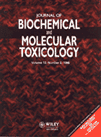
JOURNAL OF BIOCHEMICAL AND MOLECULAR TOXICOLOGY
Advancing the Frontiers of Toxicology and BiochemistryJournal of Biochemical and Molecular Toxicology, published by Wiley, plays a pivotal role in the advancement of knowledge within the fields of biochemistry, toxicology, and molecular biology. Established in 1998, this esteemed journal has garnered a significant reputation, evidenced by its current placement in the Q2 quartile across several categories, including Biochemistry, Health, Toxicology and Mutagenesis, and Medicine. With an ISSN of 1095-6670 and an E-ISSN of 1099-0461, it serves an international audience, offering critical insights and innovative research that shape our understanding of biochemical interactions and toxicological assessments. While it does not operate on an open-access model, the journal ensures rigorous peer review and high-quality publication standards, making it a valuable resource for researchers, professionals, and students dedicated to the exploration of molecular toxicology. The journal's recognized impact within the scientific community is reflected in its competitive rankings among specialized journals, fostering significant contributions to both academic and applied contexts.
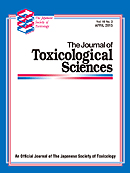
JOURNAL OF TOXICOLOGICAL SCIENCES
Fostering Collaboration in Toxicological ResearchThe Journal of Toxicological Sciences, published by the Japanese Society of Toxicological Sciences, is a prominent academic journal dedicated to the comprehensive study of toxicology and its related fields. Since its inception in 1976, the journal has provided a vital platform for researchers and professionals to disseminate innovative findings and insights in toxicology, with a focus on both experimental and clinical studies. Positioned in the Q3 quartile across various relevant categories, including Medicine (miscellaneous) and Toxicology as of 2023, the journal plays an essential role in advancing our understanding of toxic substances and their effects on biological systems. Although currently not open access, the journal maintains high academic standards and is indexed in Scopus, ranking #96 in Toxicology. Offering unique perspectives from Japan, it encourages global collaboration and discourse among toxicologists, making it an invaluable resource for students, researchers, and industry professionals alike.

Molecular & Cellular Toxicology
Fostering interdisciplinary collaboration for toxicological breakthroughs.Molecular & Cellular Toxicology, published by the Korean Society Toxicogenomics & Toxicoproteomics (KSTT), is a significant journal in the field of toxicology, providing crucial insights into molecular mechanisms underlying toxic responses. With an ISSN of 1738-642X and E-ISSN 2092-8467, this journal serves as a vital platform for researchers, professionals, and students interested in the latest findings and advancements in toxicology, health, and environmental science. Although it operates under a subscription model, it maintains rigorous peer review standards, contributing to its respectable Q3 classification in Health, Toxicology and Mutagenesis, and its Q2 standing in Pharmacology, Toxicology, and Pharmaceutics. The journal, intersecting with innovative aspects of pharmacology and public health, aims to foster a deeper understanding of toxicological impacts on cellular processes and overall health. Located in Germany and supported by a dedicated editorial board, Molecular & Cellular Toxicology stands out in the academic community, encouraging interdisciplinary discourse and collaboration to address critical toxicological challenges. Engage with us for cutting-edge research that informs and shapes the future of toxicological science.
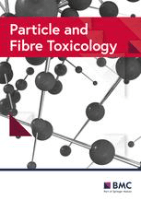
Particle and Fibre Toxicology
Advancing knowledge on particulate health impacts.Particle and Fibre Toxicology is a leading open-access journal dedicated to advancing the field of toxicology, specifically focusing on the health impacts of particulate matter and fibers. Published by BMC since 2004, this journal operates from its offices in the United Kingdom and has gained significant recognition in the scientific community, achieving an impressive impact factor that highlights its relevance and influence. As indicated by its Q1 ranking in various categories including Health, Toxicology and Mutagenesis and Medicine (miscellaneous), it occupies a prestigious position in the academic landscape, appealing to researchers, professionals, and students alike. With a Scopus ranking of #4 in Toxicology and #7 in Environmental Science, the journal ensures high visibility and accessibility, providing a platform for the dissemination of key research findings and innovative methodologies in the interdisciplinary domains of toxicology. Through its commitment to open access, Particle and Fibre Toxicology fosters knowledge-sharing and collaboration, facilitating significant advancements in our understanding of the toxicological effects of environmental agents.

Current Research in Toxicology
Pioneering Insights in Toxicology ResearchCurrent Research in Toxicology is a pioneering journal published by ELSEVIER that serves as a vital platform for disseminating cutting-edge research in the field of toxicology, spanning from biological impacts to pharmacological applications. With an ISSN of 2666-027X and an impressive Q2 ranking in key categories such as Applied Microbiology and Biotechnology, Health, Toxicology and Mutagenesis, and Toxicology, this journal underscores its commitment to high-quality research and significant contributions to the scientific community. Based in the Netherlands, Current Research in Toxicology aims to bridge the gap between academia and industry by providing rigorously peer-reviewed articles that cover a wide array of topics including novel methodologies, regulatory challenges, and emerging trends within the domain. The journal is accessible through various platforms, making it essential for researchers, professionals, and students eager to stay updated on the latest findings and advancements in toxicology. With a comprehensive focus on integrating theory with practical application, this journal is poised to influence future studies and policies in health and environmental science.

BULLETIN OF ENVIRONMENTAL CONTAMINATION AND TOXICOLOGY
Exploring the nexus of contamination and public safety.BULLETIN OF ENVIRONMENTAL CONTAMINATION AND TOXICOLOGY, published by SPRINGER, is a pivotal journal in the fields of Environmental Science, Toxicology, and Public Health. With a strong history of dissemination since its inception in 1966, the journal predominantly focuses on the latest advances in understanding environmental contaminants and their toxicological effects on health and ecosystems. It currently holds a respectable Q2 ranking across multiple categories including Health, Toxicology and Mutagenesis, Medicine (miscellaneous), and Pollution, as per the 2023 metrics. While the journal is not Open Access, it provides an invaluable platform for researchers, professionals, and students seeking to contribute to and stay informed on critical issues regarding environmental hazards and their implications. With an engaged community of scholars and practitioners, this journal continues to be an essential resource for addressing the pressing challenges of environmental contamination and its health impacts, guiding future research and policy decisions.

Frontiers in Toxicology
Connecting Researchers to the Heart of ToxicologyFrontiers in Toxicology, published by Frontiers Media SA, is a prominent open-access journal dedicated to advancing the understanding of toxicological science. Established in 2019, it serves as a vital forum for innovative research, offering insights into the pharmacological impacts and toxicological profiles of various substances. With its international reach based in Switzerland, this journal has quickly ascended in the academic community, achieving a notable Q1 ranking in Pharmacology, Toxicology and Pharmaceutics (Miscellaneous) and a Q2 ranking in Toxicology as of 2023. The journal is indexed in Scopus, where it ranks #8 out of 43 in its primary category, underscoring its influence and relevance in the field. The scope encompasses cutting-edge studies on the mechanisms of toxicity, including both human and environmental impacts, making it an essential resource for researchers, professionals, and students alike. By promoting open access to high-quality research, Frontiers in Toxicology plays a crucial role in enhancing knowledge sharing and fostering collaboration across disciplines.
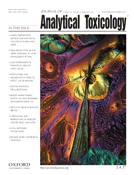
JOURNAL OF ANALYTICAL TOXICOLOGY
Bridging Chemistry and Public Health for Impactful SolutionsJOURNAL OF ANALYTICAL TOXICOLOGY, published by Oxford University Press Inc, stands as a leading platform in the field of analytical chemistry and toxicology, focusing on the rigorous exploration of methodologies and advancements in the detection of toxic substances. Since its inception in 1977, this journal has continually contributed to the scientific community, providing researchers and professionals with vital insights into chemical health, safety, and environmental implications. With an impressive Q1 ranking in both Analytical Chemistry and Chemical Health and Safety, along with reputable Q2 rankings in Environmental Chemistry and Toxicology, the journal maintains its critical standing in vibrant academic communities, ensuring the dissemination of high-quality research. Although it currently does not offer open access, articles are made available via institutional subscriptions, allowing widespread access to its valuable findings. Located in the United States, the journal contains a wealth of knowledge poised to benefit scientists and scholars engaged in toxicological research, emphasizing its importance in enhancing public health and safety.